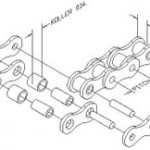What Makes a Web Site Link-Worthy?
Updated 2/2016, 12/2015, 11/2015, 4/2014, 7/0209 – Original July 2002
 The fundamental principle of the web is to allow any document to link to and to be linked from any other document. This is how Tim Berners-Lee intended it when he first proposed the hypertext protocol in March of 1989, before most of us had ever heard of the Internet. Tim actually originally named his creation “Mesh”. Tim stated, “I decided on “World Wide Web” when writing the code in 1990.”
The fundamental principle of the web is to allow any document to link to and to be linked from any other document. This is how Tim Berners-Lee intended it when he first proposed the hypertext protocol in March of 1989, before most of us had ever heard of the Internet. Tim actually originally named his creation “Mesh”. Tim stated, “I decided on “World Wide Web” when writing the code in 1990.”
[Note: While you’re here make sure to check out my Link Building Videos, Link Building Myths, and Link Request Email Tips posts.]
But flash forward 25 years, and on a web now filled with spam, uninspiring shopping sites, fake pharmacies, and 80 million blogs about hairstyles, and it begs the question: what is the motivation for one web site to link to another web site?
Initially developed due to concerns about management of general information about particle accelerators and experiments at CERN, Mesh discussed the problems of loss of information, and creation of a solution based on a distributed hypertext system as a way to help researchers interlink related documents from different computers.
Use this Category Navigation List to quickly move through my site
Newsletter
Private Strategy Session
Services
Linking Articles
The “Mesh Web” was soon discovered by those more interested in commerce, and a few million spam sites later, here we are.
It’s interesting that in the many years since Tim turned his creation loose in the wild, nearly every commercially related web marketing invention has been in some way related to the “link” (that is, an attempt to find new ways for one site to be linked to another, or URLs to be shared).
Buttons, badges and banners are, at their core, just a link from one place to another place. So are text links, whether paid for or earned or both, whether on web sites, in a tweet, a newsletter or email. All are just another form of link. A PPC listing or a Pintetest pin, or a list of search results, are nothing more than links.
Your Yahoo! and DMOZ (RIP) directory listings, BBB member page listing, even that cool widget you created – if I can click on it and be taken somewhere else, then no matter how you spin it – it’s all links.
So let’s simplify and agree that anything you can touch with your finger (or stylus) or click with a mouse, or even via voice command, if that action takes you from one piece of content to another, it is nothing more than a link.
Why does this matter?
Because the development of all form and fashion of linking and sharing methods does not change one universal truth: the less useful your content, the less likely you are to ever receive a link to it.
The less useful your content, the less likely you are to ever receive a link to it
 If we think of “useful” as a continuum, then the most useful sites are those that provide rich, quality content on a specific subject on which the editors or providers are authorities. An example would be CancerNet, aka NCI – The National Cancer Institute. Now there’s the ultimate example of content on the right side of the useful continuum — 300,000 pages on every facet of cancer, all free, all generated by experts in the field.
If we think of “useful” as a continuum, then the most useful sites are those that provide rich, quality content on a specific subject on which the editors or providers are authorities. An example would be CancerNet, aka NCI – The National Cancer Institute. Now there’s the ultimate example of content on the right side of the useful continuum — 300,000 pages on every facet of cancer, all free, all generated by experts in the field.
In fact, with very little marketing the Cancer.gov domain has millions of links pointing to it from other sites around the world. It’s one of my standard sermons: Useful content gets linked.
When CancerNet asked me to do some linking and publicity work for them, the truth is there wasn’t a whole lot for me to do. It took about a month to augment and improve the existing link profile. I found a handful of libraries with health resources that hadn’t yet linked to CancerNet, and a few topical guides. My impact was minimal when considering the vast collection of links CanetNet already had.
But the harsh reality is we can’t all be The National Cancer Institute/CancerNet. Most sites simply do not have the kind of content that engenders millions of links.
So what do you?
What if you are simply trying to sell a few basketballs and don’t have any quality content? If your site falls on the left side of the useful continuum, you have to accept that you are not going to get many links or shares. And those links you do get you will probably have to pay for. And those links you pay for are not likely to help your rankings, and might even hurt them.
If you don’t want to accept the reality I just described, if you want to earn links to your site, you have one (and only one) other option available to you.
Make it linkworthy.
What is a linkworthy site? Let’s imagine you have an online magic store that caters to professional and amateur magicians. On your site, you sell tricks, supplies, hats, capes, and wands, even the saw-the-person-in-half gag.
If your content is nothing more than an online magic store, why would anyone link to it? You might get a few links from magic web guides and link lists. A couple from your suppliers or magic industry trade associations, but then what? If you are an online store with nothing but products as your content, then you MUST look to associate/affiliate programs as a means of generating links. Basically, paying for them.
But maybe, just maybe, there is something more you CAN do, if you are willing to roll up your sleeves.
What if, along with your products, you create a searchable database of information on magic. What if you had complete biographies of thousands of magicians? What if you had a section devoted to magical world records, or a glossary of magical terms, or a directory of magicians on the Internet?
This would then be an excellent example of how a niche shopping site can add rich, relevant content, i.e. usefulness, to its web site, as well as sell merchandise. Such a site would be written about, linked to, and shared by just about anyone who cares about magic. Any magic fan with a web site and a curated list of hand picked links would be likely to link to it.
The above is not just a pie-in-the-sky scenario. It exists at MagicTricks.com.
 I know from experience it’s difficult to find high trust online venues and curator/site reviewers willing to link to sales sites. The more a site offers deep information on a certain subject, databases, community, guides, forums, reviews, etc., the more likely the editors are to want to cover it. Whether it’s a business or consumer site, the more content rich the better, especially if the site’s mission is sales. A site designed to sell a product is far different than a true reference site with hundreds and hundreds of pages of free information on a particular subject.
I know from experience it’s difficult to find high trust online venues and curator/site reviewers willing to link to sales sites. The more a site offers deep information on a certain subject, databases, community, guides, forums, reviews, etc., the more likely the editors are to want to cover it. Whether it’s a business or consumer site, the more content rich the better, especially if the site’s mission is sales. A site designed to sell a product is far different than a true reference site with hundreds and hundreds of pages of free information on a particular subject.
CancerNet/NCI and MagicTricks.com could not be more different, yet but they do have one incredibly important thing in common. Both have topic specific content written by passionate experts.
The best analogy I can think of to explain a sales-focused web site is a public library. A library is, first and foremost, about content. But libraries sell stuff. Many have snack shops, vending areas, even restaurants. You can buy copies of books, maps, digital images, rent meeting rooms. Some libraries have video rental services and some even offer consulting services. Money definitely changes hands at a library.
But nobody would confuse this commerce with a library’s true mission: being content curators and helping patrons find that content.
In like manner, a web site also needs to be a library of information on whatever its focus might be. Add great content to your product site.
Why bother?
Because useful content is more likely to attract links than products, and just because your site is product driven and your ultimate mission is to drive product sales doesn’t mean your product site cannot also be content driven.
Link well my friend,
Eric Ward
